
The Importance of Ultra-Dry Air in Industrial Applications
Ensuring the dryness of compressed air is critical in various industrial applications. Sometimes, achieving a dew point lower than -40°F, such as -100°F, is necessary. While this requirement is rare, it’s crucial to understand the underlying principles that impact such conditions. One key principle to consider is Fick’s Law of Diffusion.
Fick’s Law, established by Adolf Fick in 1855, provides a foundational understanding of diffusion processes. The law states, "The rate of diffusion in a given direction is proportional to the negative of the concentration gradient." Essentially, this means that gases intermingle, moving from areas of high concentration to areas of low concentration.
In the context of compressed air systems, Fick’s Law explains how moisture from the atmosphere can infiltrate dry air within pipes, particularly through any leaks. This effect becomes more pronounced when dealing with extremely low dew points, such as -100°F. The concentration gradient between the moist ambient air and the ultra-dry air inside the pipes is significant, increasing the potential for diffusion of water vapor into the system.
To mitigate the impact of diffusion, it’s essential to use appropriate piping materials and maintain vigilance over potential leaks. High-quality piping, such as Gardner-Denver Quick-lock Tubing, can help reduce the risk of atmospheric moisture entering the system. Regular inspection and maintenance of the piping network are crucial to ensure its integrity and effectiveness.
Purging residual moisture from the piping system downstream of the dryer is another significant challenge. According to the CAGI Compressed Air and Gas Handbook, achieving a 94°F dew point in the piping requires an enormous amount of dry air—approximately 1,000,000 cubic feet for every 1 cubic foot of piping volume. This process is both time-consuming and costly, underscoring the importance of designing and maintaining an efficient system from the start.
Consult a Specialist for Ultra-Dry Air Requirements
When dealing with ultra-dry air requirements, it is crucial to consult with specialists who can ensure your system is capable of meeting the demand. Proper system design, high-quality materials, and regular maintenance are key to achieving and maintaining the desired air quality.
FAQs
Q1: What is Fick’s Law of Diffusion?
A1: Fick’s Law states that the rate of diffusion is proportional to the negative concentration gradient, meaning gases move from high to low concentration areas.
Q2: Why is ultra-dry air necessary in some applications?
A2: Certain industrial processes require extremely dry air to prevent moisture-related issues, which can affect product quality and equipment performance.
Q3: How does atmospheric moisture affect compressed air systems?
A3: Atmospheric moisture can infiltrate the system through leaks, especially when there's a significant concentration gradient, compromising the air dryness.
Q4: What materials are recommended for piping in ultra-dry air systems?
A4: High-quality materials like Gardner-Denver Quick-lock Tubing are recommended to minimize the risk of moisture infiltration.
Q5: Why is purging moisture from the piping system so challenging?
A5: Purging requires a substantial amount of ultra-dry air, which is both time-consuming and expensive, highlighting the need for effective initial system design.



Notifications